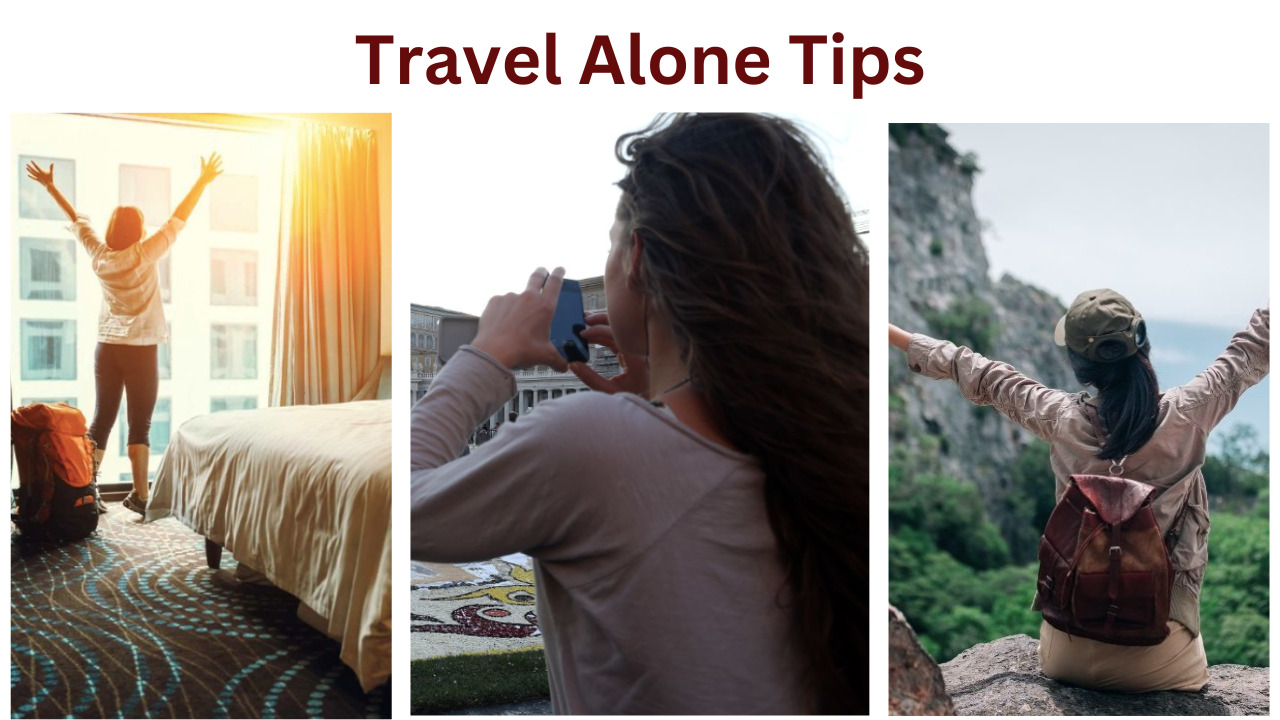Solo Travel Guide and Travel Alone Tips

Travelling alone is a unique way to explore the world that offers advantages not found in other types of travel. It’s important to try it out, even for a short time.
However, not everyone feels comfortable with the idea. Some people worry about travelling by themselves. They may have concerns about feeling lonely or staying safe during their journey.
Travel alone is an exhilarating experience that requires careful preparation. Prioritize safety by researching your destination and packing light. Stay connected by sharing your itinerary and investing in local SIM cards or portable Wi-Fi.
Embrace solo dining as an opportunity to enjoy local cuisine and the freedom of your own company. Stay aware of your surroundings and trust your instincts for your safety.
Take time for solitude to reflect and appreciate your journey. Engage with locals and fellow travellers to enhance your experience. Step out of your comfort zone and try new things. Solo female travellers should take extra precautions. Lastly, document your memories to inspire others and cherish your solo travel adventures.
1. Research and Plan Ahead
Before you set off on your solo travel adventure, it’s essential to do thorough research and plan. Start by choosing your destination wisely. Consider factors such as safety, ease of navigation, and solo-friendly activities. Use reputable travel websites, guidebooks, and online forums to gather information about your chosen location. Make a list of must-see attractions, local customs, and cultural nuances to ensure a smoother and more enriching experience.
2. Pack Smart and Light
When travelling alone, packing smart and light is crucial. Opt for a versatile, lightweight suitcase or backpack that suits your travel style. Pack essential items such as clothing suitable for the climate, comfortable shoes, toiletries, and any necessary medications. Packing a copy of important documents like your passport, identification, and travel insurance is also a good idea. Travelling alone means you’ll be responsible for carrying your belongings, so aim for practicality and efficiency.
3. Stay Connected and Share Your Itinerary
While solo travel offers freedom, staying connected and letting someone know about your plans is important. Share your itinerary with a trusted friend or family member back home. Regularly update them on your whereabouts and contact information. Additionally, consider investing in a local SIM card or portable Wi-Fi device to ensure you can stay connected with loved ones and access important information while on the go.
4. Embrace Solo Dining
One of the most intimidating aspects of solo travel can be dining alone. However, it’s an opportunity to savour the local cuisine and embrace the freedom of travelling solo. Seek out local eateries, street food stalls, and cafes where you can indulge in authentic flavours. Consider bringing a book or journal to keep you company, or enjoy observing the vibrant atmosphere around you. Remember, dining alone can be a liberating and enjoyable experience.
5. Prioritize Safety and Awareness
Your safety should always be your number one concern during your trip. Ensure you know the local traditions, regulations, and numbers to call in an emergency. Stay out late at night by yourself in unfamiliar places or with insufficient lighting. Maintain vigilance and be conscious of your location at all times. Put your faith in your gut feelings, and if anything doesn’t feel quite right, get yourself out of there. It is also highly recommended to purchase travel insurance that provides coverage for any unexpected emergencies or medical costs that may arise.
6. Embrace Solitude and Reflect
One of the distinctive advantages of travelling by oneself is the possibility to revel in solitude and take stock of one’s experiences along the way. Disconnect from your gadgets for a little while to fully appreciate the natural splendour surrounding you. Find a quiet place to sit and reflect, keep a notebook, or enjoy moments of peace. Accepting your need for solitude might help you learn more about yourself and better appreciate the world around you.
7. Engage with Locals and Fellow Travelers
Even while travelling alone presents opportunities for self-reflection, it’s crucial to make an effort to connect with people in the community and other tourists. Engage people in conversation, inquire about their recommendations, and maintain an open mind toward making new relationships.
People who live in the area typically have access to insider information and are a good source of information regarding the culture and traditions of the room. Participate in planned trips, attend events held in the area, or stay in hostels to meet people who share your interests—engaging in social activities while travelling can enrich your experience and lead to friendships that will last a lifetime.
8. Step out of Your Comfort Zone
It’s always a good idea to broaden your horizons and challenge yourself, and travelling alone is one of the best ways to do both. You owe it to yourself to face your fears and open up to new experiences. Stepping beyond your comfort zone may lead to amazing personal growth and experiences you will never forget. This can be accomplished by engaging in activities such as bungee jumping, sampling cuisine from other cultures, or participating in local rituals. Accept the unknowable and permit yourself to be open to brand-new opportunities.
9. Take Precautions for Solo Female Travelers
For solo female travellers, taking extra precautions is essential. Research the safety of your chosen destination for women travelling alone and plan accordingly. Dress modestly and respectfully to align with local customs. Avoid walking alone at night, and be cautious of accepting invitations from strangers. Utilize women-only accommodations or stay in reputable accommodations with good security measures. Trust your instincts and prioritize your well-being at all times.
10. Document and Capture Memories
Lastly, make sure to document and capture your solo travel memories. Take many photos, write in a travel journal, or create a blog to share your experiences. Not only will this serve as a wonderful keepsake, but it can also inspire and inform other travellers. Share your stories, lessons learned, and recommendations with the wider travel community. Your insights may encourage someone else to embark on their solo adventure.
11. Get Travel Insurance
Protect yourself and your trip from unexpected things by getting travel insurance. This insurance can help you if your trip gets cancelled or interrupted because of bad weather, natural disasters, illnesses, and other problems. It can also help cover expenses if you need medical care or must be evacuated, if your baggage gets delayed or stolen, and more.
12. Stay Somewhere Free Wi-Fi
As the days become shorter, you may want to spend only a little time out and about in the evenings, no matter what time of year you visit. Access to free Wi-Fi while staying at the hotel should be a top priority. Through services like Skype and Facetime, you may keep in touch with loved ones back home while away from them. While it’s still light out, you can tell your fellow travellers about everything thrilling you experienced over the day.
Is it beneficial to travel alone?
Travelling alone can be incredibly beneficial for personal growth and self-discovery. It’s a chance to push yourself and discover your talents and weaknesses. Solo travel allows you to tailor your experiences to your interests and preferences without compromising or accommodating the needs of others. It encourages independence, self-reliance, and problem-solving skills. Moreover, travelling alone opens doors to new connections and friendships, as it pushes you to engage with locals and fellow travellers in a way that may not happen as readily when travelling with companions.
Conclusion
Travelling alone requires preparation and safety. Pack light and research your destination. Tell a trusted person your plans and remain in touch. It is important to push yourself beyond your comfort zone and not hesitate to attempt new things. Take advantage of the opportunity to relax in your company and consider where you’ve been. Interacting with locals and other tourists is a great way to meet new people, learn about new cultures, and pick up Travel alone tips. Finally, write down your recollections and talk to others about your learning.
Frequently Asked Questions
Is it hard to travel alone?
Travelling alone can have challenges, such as navigating unfamiliar places and facing occasional loneliness, but it can also be an empowering and rewarding experience.
How to travel alone for the first time?
To travel alone for the first time, research and plan your destination, pack light and smart, stay connected with loved ones, prioritize safety, be open to new experiences, and embrace the opportunity for self-reflection and meeting new people.
Is it safe to travel alone?
Traveling alone can be safe if you take the necessary precautions and stay vigilant. Research your destination, follow local laws and customs, and stay connected with loved ones. Trust your instincts and prioritize your safety at all times.
How do I stay safe as a solo female traveller?
As a solo female traveller, it’s important to take extra precautions. Research the safety of your destination, dress modestly, avoid walking alone at night, and be cautious of accepting invitations from strangers. Utilize women-only accommodations or stay in reputable places with good security measures. Trust your instincts and prioritize your well-being at all times.

You must be logged in to post a comment.